
Well, it looks like the jig is up, the party's over, the lights are out and Detroit has left the building.
And instead of a $25 or $50 billion golden goose, it appears Chapter 11 bankruptcy, which allows a company to stay in business while they reorganize with a government overseer, seems to be where the Detroit Three are headed.
Today, predictably and correctly, the heads of the Detroit Three are being raked over the coals -- again -- not only for their performances at yesterday's Senate hearings, but how they got from Detroit to D.C. and back again for the hearings.
Each of them used corporate jet aircraft, and estimates of their round-trip costs are $20,000 for each Detroit Three leader. Keep in mind these were three men coming from the same place and going to the same place at the same times (and yes, we took note that something was wrong with the hearing's very appearance -- the entire panel of those testifying and everyone asking questions were white men, if I remember correctly). 
(Left to right, Ron Gettelfinger, head of the UAW, Alan Mulally of Ford, Robert Nardelli of Chrysler, Rick Wagoner of GM and Peter Morici, a university professor who specializes in macro-economics and who argued with his fellow panel members).
Ford and GM each own eight corporate aircraft, and in the interests of security, safety and scheduling, their employment contracts often mandate the use of planes in these fleets when they travel. Whether to Washington for a hearing, Monterey, CA, for a round of golf at Pebble Beach or to check out the Tokyo Motor Show, these planes get heavy use for work -- and play.
But a Northwest flight which left Detroit for D.C. around 9am Tuesday had round trip coach seats going for around $300, and first class seats went for under $900. Still a lot less than $20K, and it would have looked a lot better to the American public.
First class apparently isn't good enough for these corporate titans, these masters of the universe.
Richard Wagoner (with henchman Robert Lutz right behind him), Alan Mulally and Robert Nardelli, leaders of GM, Ford and Chrysler, respectively, found themselves in front of a U.S. Senate committee where both Democrats and Republicans were in no mood to hand out more cash to any company.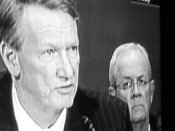
(GM's Rick Wagoner with Robert Lutz behind him on the right).
The irony is that Detroit would probably have failed anyway; the recession just sped things up. And as many senators pointed out yesterday, not even one of the Detroit Three have developed rational, sensible and do-able plans for what they'd do with any monies they might get from Washington. Nor is there anything in writing which, if direct loans do happen, details how they'd pay the money back.
Chrysler's Robert Nardelli, when asked how his company would pay back any loans, said something to the effect of, "Well, we plan on selling a lot more cars, that's how." Well, ask a silly question, you get a silly answer, right?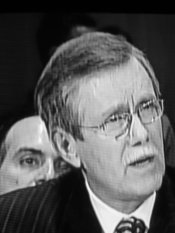
(United Auto Workers' boss Ron Gettelfinger testified and sat at the same table as those who are usually his adversaries, leaders of the Detroit Three. When an entire industry is at stake, strange relationships can develop).
David Halberstam, the late, great American journalist, wrote a book in 1986 about America versus Japan in the car business, and called it The Reckoning. Detroit (specifically Ford) didn't look very good when Halberstam compared it to Nissan.
Called before the Senate's Banking, Housing and Urban Affairs Committee, chaired by Chris Dodd, America's carmakers found themselves in the hot seat, not an unusual location for Detroit leaders, as they've all fought almost every proposed government rule and regulation, especially those concerned with safety, improving fuel mileage and lowering emissions. 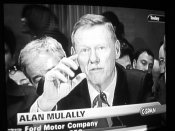
(Alan Mulally got a signing bonus of over $20,000,000 when he left the top job at Boeing to replace William Clay Ford as chief executive at the Dearborn, MI, carmaker).
The hearing signaled what looks like the ultimate day of reckoning for this country's once-great and world-dominating car making industry. All Americans are tired of the excuses, the explanations, the reliance on muscle and brawn rather than on brains and technology.
Detroit executives still possess huge egos, tempered with a big dollop of outright arrogance. Two of them, Nardelli and Mulally, tried to evade some questions claiming that they'd only had their jobs for a year or two, and couldn't speak to decisions made by their predecessors. It sounded like the adult version of, "A dog ate my homework."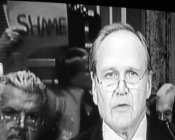
(A member of Code Pink holds a "Shame" sign behind Chrysler's Nardelli during his testimony; this group of brave women are at every important Congressional hearing, making their case in imaginative ways).
What Americans saw through these hearings (which continued into today) was what those of us who have written about the industry for decades have seen -- and heard -- hundreds of times.
"We're right around the corner from success!" "Don't look too closely at this year's models, but wait until you see what we have for next year!" "Americans will eventually tire of buying cars from all these foreign companies, and they'll come back to our products!" "These foreign outfits get all sorts of help from their governments that we don't get here, so how can we even try to compete?" "What could we do? The American public was demanding bigger, more spacious, more comfortable and more powerful cars and trucks, and naturally we have to build what the customers want!"
As an update, President Bush won't allow Detroit access to any part of the $700 billion bailout fund. Barack Obama says he is committed to saving Detroit, and favors the companies' original request for not $25, but $50 billion.
But if Harry Reid continues to push his Detroit Three bill, we'll see no government oversight of any money given or loaned nor any mandate for improving fuel economy. Detroit could wind-up like a kid with mom's credit card in the auto parts shop downtown. A Senate vote on the bill has been delayed as negotiators from both sides try to craft an agreement. No matter what they produce, the Detroit Three will look very different a year now.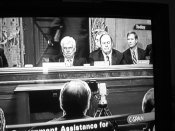
(From left, Senators Chris Dodd of Connecticut (D) and Richard Shelby of Alabama (R) both asked tough questions and often got less than complete answers from the leaders of the Detroit Three).
Read More: